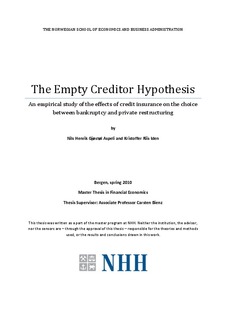The empty creditor hypothesis : an empirical study of the effects of credit insurance on the choice between bankruptcy and private restructuring
Master thesis
Permanent lenke
http://hdl.handle.net/11250/168457Utgivelsesdato
2010Metadata
Vis full innførselSamlinger
- Master Thesis [4372]
Sammendrag
The term empty creditor refers to a creditor who has obtained insurance against default, but who otherwise retains control rights in and outside bankruptcy. Several commentators have raised concerns that such creditors pose problems for private debt renegotiations and that they influence bankruptcy settlements. We analyze the problem empirically by studying a sample of 218 distressed debt restructurings in the U.S. between 1995 and 2010. Our study shows that the existence of credit insurance does not significantly impact the choice between private renegotiation and bankruptcy, but that other factors play a more important role. In particular, a private workout is more likely to succeed when firms have higher going-concern values prior to their restructuring effort and if more of a firm’s debt is owed to banks and private lenders. Restructuring privately is less likely to succeed when more debt is public or owed to trade creditors, when leverage is high, and when there is greater information asymmetry between a firm and its creditors. We also present stock price evidence which suggests that the market treats private workouts more favorably than bankruptcy. This lends support to previous research which indicates that restructuring in bankruptcy is generally more costly than restructuring privately.
